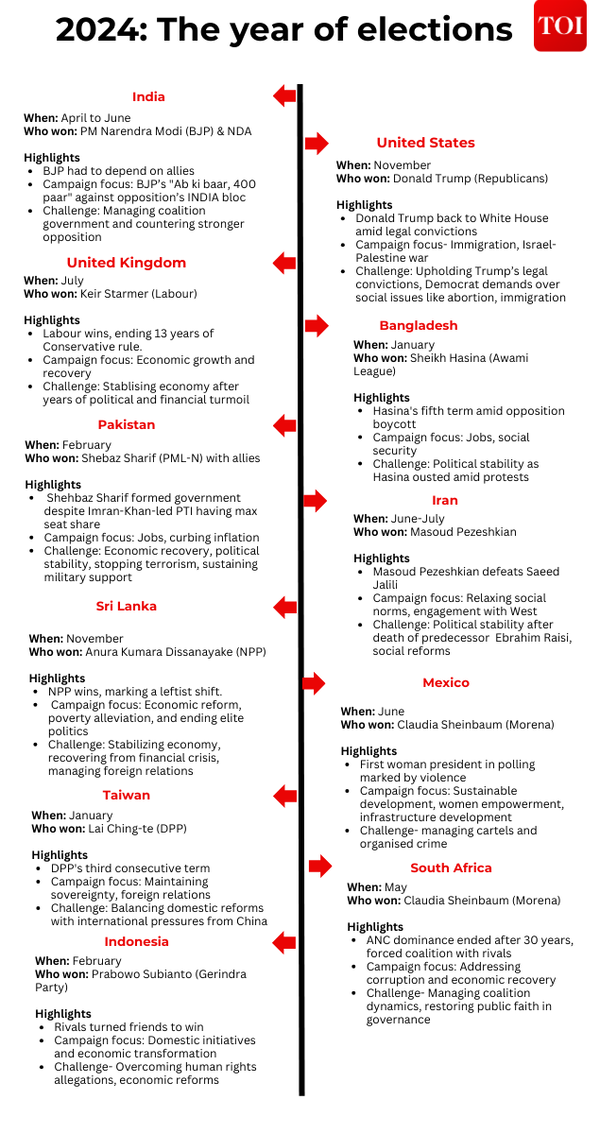The year 2024 brought dramatic transformations across the globe, reshaping the global political scene, influenced by economic challenges, social movements and policy concerns.
The elections in over 70 countries ushered in new faces and fresh mandates.

Here’s a snapshot of key elections that defined the year by bringing changes in the political dynamics
India’s coalition politics
The 2024 Lok Sabha elections reshaped India’s political landscape as PM Modi’s “Ab ki baar, 400 paar” didn’t come to fruition.The BJP secured 240 seats, falling short of the 272 needed for a majority.
Thus, the allies Nitish Kumar and Chandrababu Naidu became the kingmakers, and offered support of 12 seats (JDU) and 16 seats (TDP) respectively. Other key allies like Chirag Paswan’s LJP (Ram Vilas) and Eknath Shinde’s Shiv Sena also played crucial roles.
Also read: BJP’s shaky start, regional resurgence, INDIA bloc’s woes
Meanwhile, the opposition gained ground, with the INDIA bloc led by Congress securing 234 seats. Congress alone won 99 seats, enabling Rahul Gandhi to be nominated as leader of the opposition in Lok Sabha — a fresh challenge for BJP as it navigates coalition governance after two solo terms.
Read more: 2024 a year of mixed fortunes for Congress
US turns red again
Economic concerns and immigration debate dominated the US election race. After President Biden’s unexpected withdrawal, Vice President Kamala Harris became the Democratic nominee, gaining massive support but still fell short to overcome Donald Trump‘s campaign.
Trump won the popular vote, swept all seven swing states, and weathered two assassination attempts and legal troubles, being convicted on felony charges.
Harris faced criticism over rising prices, immigration, and US support for Israel, while her role as VP led to questions on promises post poll over implementation in present.
Also read: The 12 months that led to Donald Trump’s re-election
UK’s Labour wins
Labour’s decisive win ended 13 years of Conservative rule, with Keir Starmer defeating Rishi Sunak, the last Tory PM. Political instability, leadership scandals, and the fallout from David Cameron’s controversial Brexit decision eroded Conservative support.
Economic dissatisfaction and failures in connecting with voters under Boris Johnson, Liz Truss, and Sunak further weakened the Tories. Starmer’s centrist approach, focus on ethics, and addressing the cost-of-living crisis resonated with voters.
Bangladesh’s Sheikh Hasina wins ballot, loses on street
Sheikh Hasina’s Awami League won a fifth term in Bangladesh elections, overshadowed by a BNP-led boycott and claims of unfair practices.
However, August marked an end of her leadership, fueled by unrest over job quotas and broader anti-government sentiment. Intensifying clashes forced Hasina to resign and flee to India. Nobel Laureate Muhammad Yunus was appointed interim leader, marking a dramatic political shift and a situation where a ballot win could not sustain on the streets.
PTI party’s majority but eventual failure in Pakistan
Pakistan’s general election resulted in a hung parliament. Imran Khan’s PTI-backed independents emerged as the largest bloc but failed to form a government. Shehbaz Sharif of the PML-N secured the premiership through alliances with the PPP, MQM-P, and smaller groups, aided by military backing.
Allegations of vote manipulation and economic instability dominated the discourse.
Iran’s reformist turn
Masoud Pezeshkian, a reformist heart surgeon, won Iran’s presidential runoff against hard-liner Saeed Jalili after the death of President Ebrahim Raisi.
Amid low turnout and growing public dissent since Mahsa Amini’s 2022 death, Pezeshkian pledged moderate reforms, including relaxing hijab laws, while respecting Supreme Leader Khamenei’s authority.
Sri Lanka’s political revolution
President Anura Kumara Dissanayake’s National People’s Power (NPP) party became the first leftist coalition to control both the presidency and parliament.
The NPP’s victory was driven by public dissatisfaction with traditional parties, which were blamed for corruption and mismanagement, particularly during the 2022 economic crisis. Dissanayake’s focus on economic reform, poverty alleviation, and pro-poor policies won widespread support. With a strong majority, the NPP now faces the challenge of stabilizing the economy and addressing the population’s needs while navigating foreign relations.
Mexico’s first female president in bloody polls
Claudia Sheinbaum made history as Mexico’s first female president, winning a violent election marred by cartel-related killings of 38 candidates.
Her administration inherits the challenges of combating organized crime, managing US relations, and addressing economic reforms.
Taiwan’s sovereignty commitment
Lai Ching-te of Taiwan’s Democratic Progressive Party won the presidency, continuing the DPP’s rule for a third term but with a reduced margin. He pledged to uphold Taiwan’s sovereignty while pursuing peace amid rising tensions with China, which views him as a separatist.
Domestically, Lai faces challenges like housing, wages, and population decline, while balancing reforms and Taiwan’s strategic ties with the US against its complex relationship with China.
South Africa’s forced coalition
South Africa’s ANC lost its parliamentary majority for the first time since 1994, the year Nelson Mandela was the president. This year, it was forced into an unprecedented coalition with the Democratic Alliance (DA) and smaller parties. President Cyril Ramaphosa retained his role, but managing coalition dynamics and addressing economic recovery remains a challenge.
Indonesia’s rivals turned friends
Prabowo Subianto, Indonesia’s former defense minister, was sworn in as the country’s eighth president. Subianto has a controversial past, with allegations of human rights abuses during Indonesia’s military dictatorship. Despite being a political rival to outgoing President Joko Widodo in the 2014 and 2019 elections, he later joined Widodo’s cabinet as defense minister after the 2019 polls, forming an unexpected alliance.
During his campaign, Subianto promised to continue Widodo’s key policies, including building a new capital city in Borneo and restricting raw material exports to boost local industries. Backed by Widodo, Subianto won the February presidential election by a large margin.
